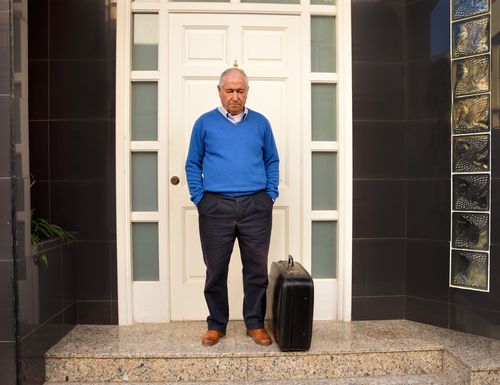Discovered unable to pay, thousands of elderly and disabled nursing home residents across the nation have been sent packing.
Nursing Homes Evicting Elderly Poor – Illegally
According to a recent NBC News article, certain American nursing homes are discharging poorer residents from long-term care facilities against their will, sometimes without notice. Low-income, long-term residents dependent on Medicare or Medicaid who receive notice of a change in their coverage are being given their walking papers by some U.S. long-term care facilities.
“Most people don’t even know they have rights,” said AARP Foundation vice president Kelly Bagby who went on to say that while nursing homes sometimes give residents advance notice of their eviction, other times patients are [without warning] expected to find a new place to live.
Nursing homes may, under certain circumstances, legally evict residents. For example, if a resident’s health demonstrates a certain degree of improvement or, conversely, if a patient has needs beyond the scope of the facility, a nursing home may discharge that patient. Beyond health reasons, should a resident stop paying for long-term care and not apply for Medicaid or Medicare, that resident may be evicted; however, federal law dictates that facilities must give written notice 30 days in advance of an eviction. More, facilities are required by law to create a transition plan for residents and work with them to put them into action. At times these requirements are flouted, and in certain extreme cases, some nursing homes, says NBC News, have gone so far as to “dump” residents at homeless shelters.
According to the article, in 2017 long-term care ombudsmen—federally-mandated advocates for residents of nursing homes, assisted living facilities, and care homes—received nearly 11,000 complaints about discharges and transfers, up from just over 9,000 in 2015. Many of these grievances, which Bagby suggested only hint at a deeper problem, go unaddressed rather than resulting in formal state investigations.
The NBC News article went on to suggest a trend in resident evictions: facilities will evict long-term residents who are low-income recipients of Medicaid and take in their place rehab patients covered by Medicare. The reason for this: even though rehabilitation patients stay for a shorter duration, the higher rate of Medicare reimbursement is far more lucrative for nursing homes. Despite the fact that discrimination against residents based on payment source is illegal, it “happens all the time,” according to California Advocates for Nursing Home Reform attorney Tony Chicotel, who said he receives daily calls to the nonprofit about residents who have been threatened with eviction.
Protect Your Loved One
Finding just the right nursing home for a beloved family member can be an arduous process. Once you’ve found a long-term solution, you want to be secure in the notion your loved one won’t be summarily evicted or otherwise stripped of his or her rights. If you or a family member have been discharged from a Pennsylvania, Philadelphia, or New Jersey nursing home or if you suspect abuse or neglect has occurred within a Philadelphia/PA or NJ facility where your loved one resides, don’t hesitate to contact nursing home neglect and abuse attorney Brian P. Murphy to learn about your rights and legal options.







